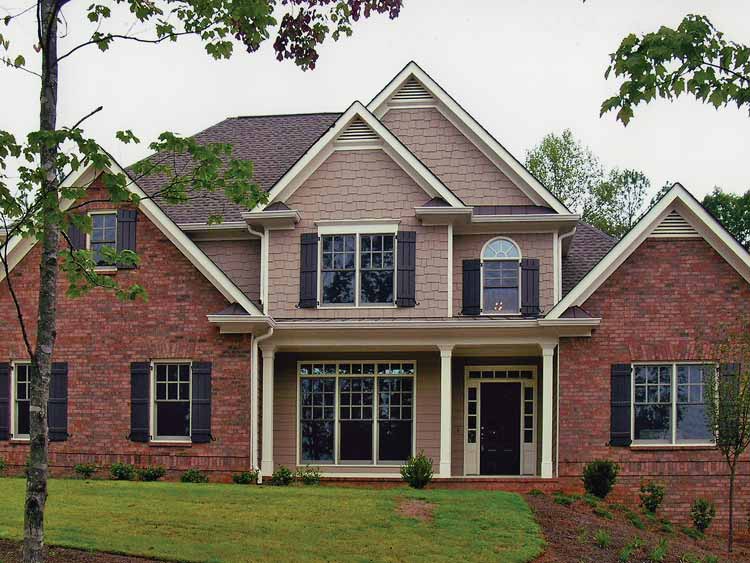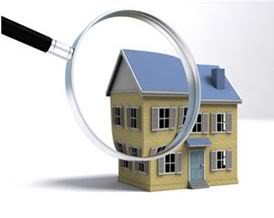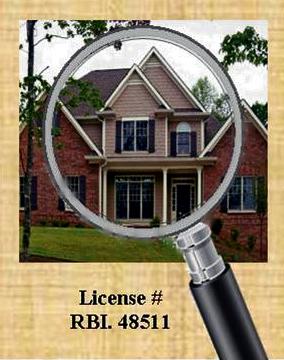





EDWARD B. JONES
TRUSTED HOME INSPECTIONS
TRUSTED HOME INSPECTIONS
BUYERS
SELLERS
OWNERS
INVESTORS

SELLERS INSPECTION
The pre-listing inspection can increase property marketability. A much smoother transaction is possible by alerting you to defects that a buyers inspector will find later. This allows you to repair or disclose these items as you choose and prevents them from becoming negotiating points after a contract is signed. It also gives you time to find reasonably priced contractors without the pressure of a closing deadline. A pre-listing inspection can reduce your liability by adding professional supporting documentation to your disclosure statement. The inspected areas of a home/building will consist of all of the major visible and accessible electro-mechanical systems as well as the major visible and accessible structural systems and components of a building as they appeared and functioned at the time and date of the inspection.
The pre-listing inspection can increase property marketability. A much smoother transaction is possible by alerting you to defects that a buyers inspector will find later. This allows you to repair or disclose these items as you choose and prevents them from becoming negotiating points after a contract is signed. It also gives you time to find reasonably priced contractors without the pressure of a closing deadline. A pre-listing inspection can reduce your liability by adding professional supporting documentation to your disclosure statement. The inspected areas of a home/building will consist of all of the major visible and accessible electro-mechanical systems as well as the major visible and accessible structural systems and components of a building as they appeared and functioned at the time and date of the inspection.
DEFINITION OF A HOME INSPECTION
A home inspection is an objective, visual examination of those easily accessible areas that an inspector can clearly see and of the physical structure and systems of a home, from the roof to the foundation. Having a home inspected is like giving it a physical check-up. If problems or symptoms are found, the inspector may recommend further evaluation. No destructive testing or dismantling is done during the course of an inspection, hence an inspector can only tell a client exactly what was clearly in evidence at the time and date of the inspection.
A home inspection is an objective, visual examination of those easily accessible areas that an inspector can clearly see and of the physical structure and systems of a home, from the roof to the foundation. Having a home inspected is like giving it a physical check-up. If problems or symptoms are found, the inspector may recommend further evaluation. No destructive testing or dismantling is done during the course of an inspection, hence an inspector can only tell a client exactly what was clearly in evidence at the time and date of the inspection.
OWNERS INSPECTION
If you are already a homeowner, a home inspection may be used to identify problems in the making, and to learn preventive measures that might avoid costly future repairs. If you are planning to sell your home, you may wish to have an inspection prior to placing your home on the market. This will give you a better understanding of conditions which may be discovered by the buyer's inspector, and an opportunity to make repairs that will put the house in better selling condition.
If you are already a homeowner, a home inspection may be used to identify problems in the making, and to learn preventive measures that might avoid costly future repairs. If you are planning to sell your home, you may wish to have an inspection prior to placing your home on the market. This will give you a better understanding of conditions which may be discovered by the buyer's inspector, and an opportunity to make repairs that will put the house in better selling condition.
BEFORE THE INSPECTION:
You have a goal, you want to be well informed, and you want to make a wise investment. Choose a home inspection company that understands your needs and will work with you to help you meet your goals. Be sure that your home inspection report will be a detailed written report. A checklist may lack details and may not provide all the information or advice.
DURING THE INSPECTION:
Be sure to attend the home inspection; the inspection could take anywhere from two to four hours. One picture is worth a thousand words, and this is a unique opportunity to learn about your new home and its systems. Be sure to ask questions. A simple philosophy, the only stupid question is the one you DON'T ask. Learn as much as you can from the home inspector after the inspection. Be sure that all of the following points are fully covered;
Once you find the home that's right for you, there's nothing more important than the foundation. You need to know that the home you are purchasing is properly leveled.
The plumbing, heating, air-conditioning, and electrical systems should be thoroughly inspected and evaluated. The home inspector should look for aluminum electrical distribution wires, electrical systems that are not adequate for modern usage, lead and galvanized steel water supply pipes, aged and inefficient heating and air-conditioning systems, etc.
Make sure you ask questions about the roof. A solid roof covers the home and its foundation.
The home inspection report should be available in the next 48 hours after the home inspection but a generalized verbal report should be obtained at the conclusion of the home inspection.
AFTER THE INSPECTION:
You Should Know:
The condition of the home you are purchasing, including all positive and negative aspects.
What repairs are needed (as well as the urgency of those repairs) and the magnitude of the repair costs.
The proper course of corrective repairs, and whether alternatives are available.
If there are any safety issues that need immediate attention.
You Should Expect:
An easy-to-understand, detailed home inspection report in writing.
Answers to any questions you may have regarding the report.
The home inspector to be available to answer future questions.
You Should Not Expect:
The home inspector to offer to repair, for a fee, any uncovered defects.
If you have any questions, or need further information, please don't hesitate to contact us. We're here to help!
You have a goal, you want to be well informed, and you want to make a wise investment. Choose a home inspection company that understands your needs and will work with you to help you meet your goals. Be sure that your home inspection report will be a detailed written report. A checklist may lack details and may not provide all the information or advice.
DURING THE INSPECTION:
Be sure to attend the home inspection; the inspection could take anywhere from two to four hours. One picture is worth a thousand words, and this is a unique opportunity to learn about your new home and its systems. Be sure to ask questions. A simple philosophy, the only stupid question is the one you DON'T ask. Learn as much as you can from the home inspector after the inspection. Be sure that all of the following points are fully covered;
Once you find the home that's right for you, there's nothing more important than the foundation. You need to know that the home you are purchasing is properly leveled.
The plumbing, heating, air-conditioning, and electrical systems should be thoroughly inspected and evaluated. The home inspector should look for aluminum electrical distribution wires, electrical systems that are not adequate for modern usage, lead and galvanized steel water supply pipes, aged and inefficient heating and air-conditioning systems, etc.
Make sure you ask questions about the roof. A solid roof covers the home and its foundation.
The home inspection report should be available in the next 48 hours after the home inspection but a generalized verbal report should be obtained at the conclusion of the home inspection.
AFTER THE INSPECTION:
You Should Know:
The condition of the home you are purchasing, including all positive and negative aspects.
What repairs are needed (as well as the urgency of those repairs) and the magnitude of the repair costs.
The proper course of corrective repairs, and whether alternatives are available.
If there are any safety issues that need immediate attention.
You Should Expect:
An easy-to-understand, detailed home inspection report in writing.
Answers to any questions you may have regarding the report.
The home inspector to be available to answer future questions.
You Should Not Expect:
The home inspector to offer to repair, for a fee, any uncovered defects.
If you have any questions, or need further information, please don't hesitate to contact us. We're here to help!
BUYERS INSPECTION
The purchase of a home is possibly the largest single investment you will ever make. An educated buyer prepared with past and current knowledge of the condition of the property may alleviate or may minimize any unpleasant surprises after the closing. You should learn as much as you can about the condition of the property and the need for any major repairs before you buy.
A home inspection also points out the positive aspects of a home, as well as the maintenance which will be necessary to keep it in good shape. After the inspection, you will have a much clearer understanding of the property condition which you are about to purchase.(see additional buyer information below)
The purchase of a home is possibly the largest single investment you will ever make. An educated buyer prepared with past and current knowledge of the condition of the property may alleviate or may minimize any unpleasant surprises after the closing. You should learn as much as you can about the condition of the property and the need for any major repairs before you buy.
A home inspection also points out the positive aspects of a home, as well as the maintenance which will be necessary to keep it in good shape. After the inspection, you will have a much clearer understanding of the property condition which you are about to purchase.(see additional buyer information below)
INVESTORS INSPECTION
The investors inspection will quickly help identify any major areas of concern and any areas requiring additional unforeseen maintenance and repair. Quickly addresses any serious faults the property may possess. The bottom line is to save you money and increase your bottom line. In addition, provide you with a quick report which will help determine the time frame involved for maintenance and repairs prior to occupation.
The investors inspection will quickly help identify any major areas of concern and any areas requiring additional unforeseen maintenance and repair. Quickly addresses any serious faults the property may possess. The bottom line is to save you money and increase your bottom line. In addition, provide you with a quick report which will help determine the time frame involved for maintenance and repairs prior to occupation.
BUYERS
ADDITIONAL BUYER INFORMATION